Intro
Discover the importance of Vitamin D Test 25 Hydroxy, a crucial blood test measuring 25-hydroxyvitamin D levels, diagnosing deficiency, and guiding supplementation for bone health, immune function, and disease prevention.
Vitamin D is an essential nutrient that plays a crucial role in maintaining strong bones, immune function, and overall health. Despite its importance, many people around the world suffer from vitamin D deficiency, which can lead to a range of health problems. One of the most effective ways to determine vitamin D levels is through a 25-hydroxyvitamin D test. In this article, we will delve into the world of vitamin D, exploring its benefits, the importance of testing, and what the results of a 25-hydroxyvitamin D test can reveal.
Vitamin D is a fat-soluble vitamin that can be obtained through diet, sunlight exposure, and supplements. It is essential for maintaining strong bones, as it helps the body absorb calcium, a critical mineral for bone health. Vitamin D also plays a role in immune function, with research suggesting that it may help protect against autoimmune diseases, such as multiple sclerosis and type 1 diabetes. Furthermore, vitamin D has been linked to a reduced risk of certain types of cancer, including colorectal, breast, and prostate cancer.
Despite the importance of vitamin D, many people are deficient in this essential nutrient. According to the National Institutes of Health, approximately 40% of adults in the United States have a vitamin D deficiency. This deficiency can be caused by a range of factors, including limited sunlight exposure, a diet lacking in vitamin D-rich foods, and certain medical conditions, such as kidney or liver disease. A vitamin D deficiency can lead to a range of health problems, including osteoporosis, osteopenia, and an increased risk of fractures.
Vitamin D Test 25 Hydroxy
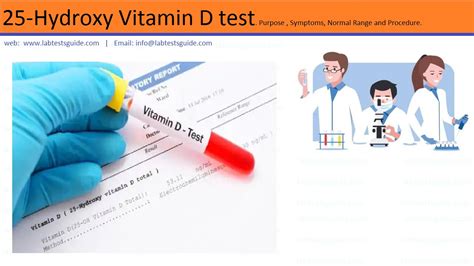
A 25-hydroxyvitamin D test is a blood test used to measure the levels of vitamin D in the body. This test is considered the most accurate way to determine vitamin D levels, as it measures the amount of 25-hydroxyvitamin D, the inactive form of vitamin D, in the blood. The test is typically performed by a healthcare provider, who will take a blood sample from a vein in the arm. The blood sample is then sent to a laboratory for analysis, where the levels of 25-hydroxyvitamin D are measured.
Why is the 25-Hydroxyvitamin D Test Important?
The 25-hydroxyvitamin D test is essential for determining vitamin D levels, as it can help identify individuals who are deficient in this essential nutrient. The test can also be used to monitor the effectiveness of vitamin D supplements or other treatments. Furthermore, the test can help healthcare providers diagnose certain medical conditions, such as rickets or osteomalacia, which are caused by a vitamin D deficiency.Benefits of Vitamin D
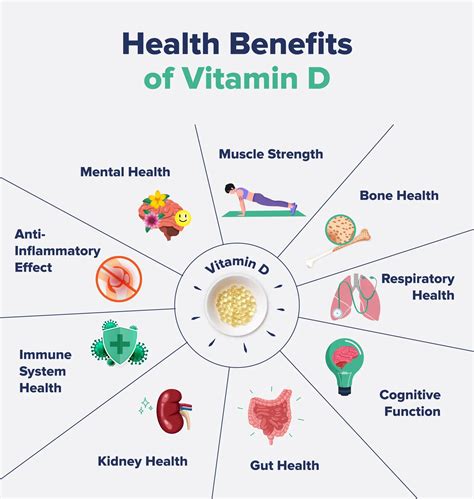
Vitamin D has a range of benefits, including:
- Maintaining strong bones: Vitamin D helps the body absorb calcium, which is essential for maintaining strong bones.
- Boosting immune function: Vitamin D has been shown to have immunomodulatory effects, which can help protect against autoimmune diseases.
- Reducing the risk of certain cancers: Vitamin D has been linked to a reduced risk of certain types of cancer, including colorectal, breast, and prostate cancer.
- Improving mood: Vitamin D has been shown to have a positive effect on mood, with some studies suggesting that it may help alleviate symptoms of depression.
Vitamin D Deficiency Symptoms
A vitamin D deficiency can cause a range of symptoms, including: * Fatigue and weakness * Bone pain or muscle weakness * Mood changes, such as depression or anxiety * Increased risk of infections * Hair lossVitamin D Food Sources
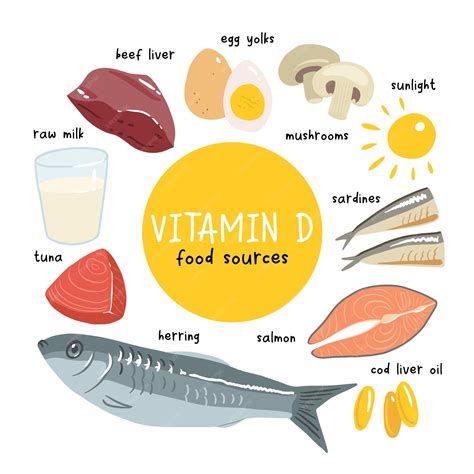
Vitamin D can be obtained through a range of food sources, including:
- Fatty fish, such as salmon and mackerel
- Fortified dairy products, such as milk and cheese
- Mushrooms, such as shiitake and portobello
- Fortified cereals and orange juice
- Egg yolks
Vitamin D Supplements
Vitamin D supplements can be an effective way to boost vitamin D levels, particularly for individuals who are deficient in this essential nutrient. There are two main types of vitamin D supplements: D2 and D3. D3 is considered the more effective form of vitamin D, as it is more easily absorbed by the body.Understanding 25-Hydroxyvitamin D Test Results
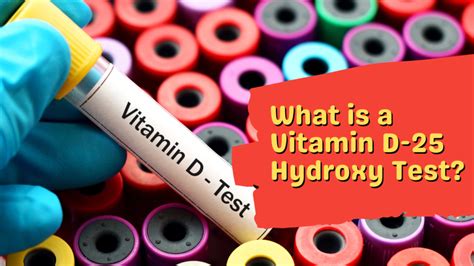
The results of a 25-hydroxyvitamin D test are typically measured in nanograms per milliliter (ng/mL). The following are the typical ranges for vitamin D levels:
- Normal: 30-50 ng/mL
- Insufficient: 20-29 ng/mL
- Deficient: <20 ng/mL
What to Do if You Have a Vitamin D Deficiency
If you have a vitamin D deficiency, there are several steps you can take to boost your vitamin D levels. These include: * Taking vitamin D supplements: Vitamin D supplements can be an effective way to boost vitamin D levels, particularly for individuals who are deficient in this essential nutrient. * Increasing sunlight exposure: Sunlight exposure can help boost vitamin D levels, particularly during the summer months. * Eating vitamin D-rich foods: Eating foods rich in vitamin D, such as fatty fish and fortified dairy products, can help boost vitamin D levels.Vitamin D and Bone Health
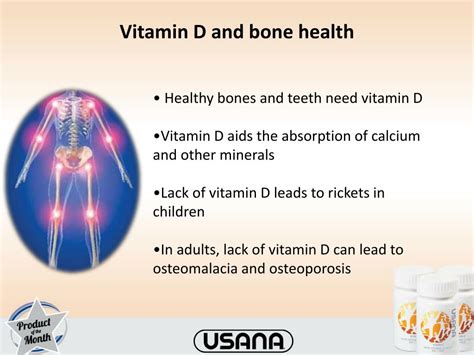
Vitamin D plays a critical role in maintaining strong bones, as it helps the body absorb calcium. A vitamin D deficiency can lead to a range of bone health problems, including osteoporosis and osteopenia. Osteoporosis is a condition characterized by brittle and porous bones, which can increase the risk of fractures. Osteopenia is a condition characterized by low bone density, which can also increase the risk of fractures.
Vitamin D and Immune Function
Vitamin D has been shown to have immunomodulatory effects, which can help protect against autoimmune diseases. Autoimmune diseases occur when the immune system mistakenly attacks healthy cells and tissues. Vitamin D has been shown to have a positive effect on immune function, with some studies suggesting that it may help alleviate symptoms of autoimmune diseases, such as multiple sclerosis and type 1 diabetes.Vitamin D and Cancer

Vitamin D has been linked to a reduced risk of certain types of cancer, including colorectal, breast, and prostate cancer. The exact mechanisms by which vitamin D reduces the risk of cancer are not fully understood, but it is thought to involve the regulation of cell growth and differentiation.
Vitamin D and Mood
Vitamin D has been shown to have a positive effect on mood, with some studies suggesting that it may help alleviate symptoms of depression. The exact mechanisms by which vitamin D affects mood are not fully understood, but it is thought to involve the regulation of neurotransmitters, such as serotonin and dopamine.What is the recommended daily intake of vitamin D?
+The recommended daily intake of vitamin D varies by age and other factors, but the general recommendation is 600-800 IU per day.
Can I get enough vitamin D from sunlight exposure alone?
+While sunlight exposure can help boost vitamin D levels, it is unlikely to provide enough vitamin D for optimal health, particularly during the winter months or for individuals with limited sunlight exposure.
What are the symptoms of a vitamin D deficiency?
+The symptoms of a vitamin D deficiency can include fatigue, bone pain, and mood changes, among others.
How long does it take to correct a vitamin D deficiency?
+The time it takes to correct a vitamin D deficiency can vary depending on the severity of the deficiency and the individual's overall health, but it can typically take several weeks to several months.
Can I take too much vitamin D?
+Yes, it is possible to take too much vitamin D, which can cause a range of symptoms, including nausea, vomiting, and kidney damage.
In conclusion, vitamin D is an essential nutrient that plays a critical role in maintaining strong bones, immune function, and overall health. A 25-hydroxyvitamin D test is a valuable tool for determining vitamin D levels and identifying individuals who are deficient in this essential nutrient. By understanding the benefits and importance of vitamin D, individuals can take steps to boost their vitamin D levels and reduce the risk of vitamin D deficiency. We invite you to share your thoughts and experiences with vitamin D in the comments section below. If you found this article informative, please consider sharing it with your friends and family to help spread awareness about the importance of vitamin D.
